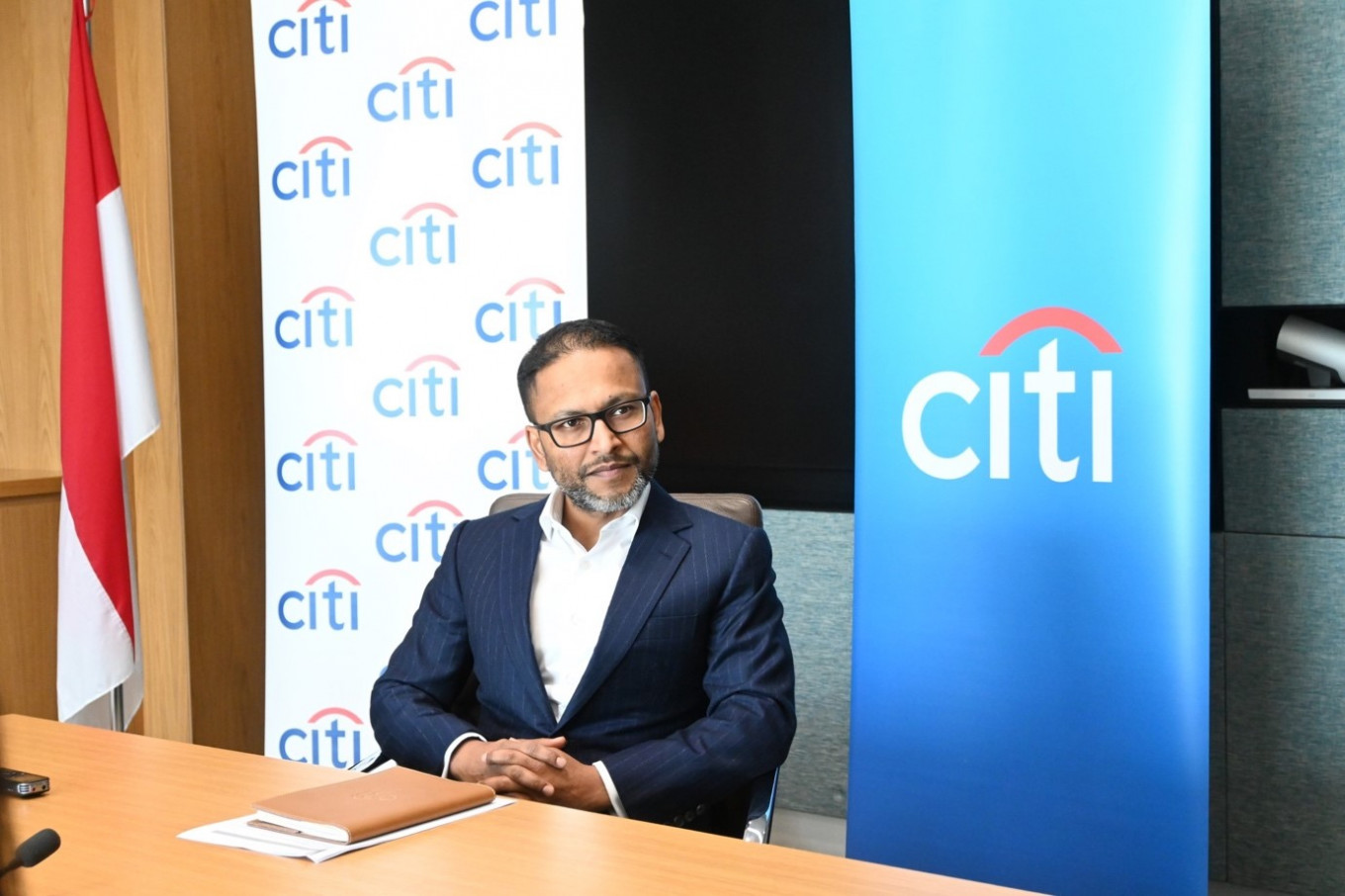Popular Reads
Top Results
Can't find what you're looking for?
View all search resultsPopular Reads
Top Results
Can't find what you're looking for?
View all search resultsCiti to co-exist, co-create with Indonesian fintech industry
Change text size
Gift Premium Articles
to Anyone
H
aving sold its retail business in Indonesia, Citi is now focusing its services on institutional customers to go through a business transformation and accelerate digitalization in the country to benefit from the potential exponential growth of the country’s digital economy.
Citi Managing Director and Global Co-Head of Payments & Receivables Amit Agarwal said in a recent interview that Indonesia’s digital economy and its growth are still at an early stage, with cash transactions still dominating. In the next five years, the size of the global digital economy will likely grow significantly.
The Payments Report by Worldpay shows that most e-commerce transactions in Indonesia last year used digital/mobile wallets by 39 percent, followed by bank transfers by 23 percent. This is starkly different from transactions at physical points of sales (POS), which mostly relied on cash at 51 percent, followed by digital/mobile wallets by 19 percent. Cash payment is still a big part of Indonesia and therefore there is a lot of room for innovation.
As a strong global bank, Citi wants to be part of the innovation and growth by focusing its services on institutional customers, including financial technology (fintech) companies, by providing seamless payment support through its global network of payment.
“Fintech companies are using us to provide payment services to their customers. We are also partnering with fintechs to build solutions for our customers. So together with fintech, we co-exist and co-create,” Agarwal said.
Citi does not see fintechs as a threat to traditional banks. Each traditional bank and fintech brings certain assets and strength that if put together, can provide better solutions for the clients. Fintechs will bring the customer experience, while financial institutions provide the regulatory framework. Payments are a highly regulated money movement activity. Just because the technology is disrupted, it does not mean there is no regulation for fintech as traditional banks have knowledge of the regulation. Traditional banks are in partnerships with fintechs.
There are similarities between the payment industry globally and in Indonesia. Like in other countries, Indonesia is focusing on old to new, such as digitalizing retail payment, wholesale payment infrastructures and for the Real Time Gross Settlement (RTGS) infrastructure to adopt the ISO 20022 XML. The Indonesian central bank, Bank Indonesia (BI), is also modernizing instant payment through request to pay, QR code, as well as improving data security, information security, cyber security and fraud management.
There is a unique pattern in Indonesia in which there is a tremendous amount of focus on transformation and digitalization on a grassroots level: the micro, small, and medium enterprises (MSMEs), which represent around 60 percent of the country’s gross domestic product (GDP). The digitalization of MSMEs would not only accelerate digitalization in the country's business sector but also create new players at the national level.
Agarwal observed that digital companies in Indonesia are growing rapidly, providing banks with opportunities to support them.
Agarwal also said that Citi was committed to be part of the Indonesian business journey. The bank has been around for 54 years, since 1968, and over the years, Citi has built a deep network within the country, a client base reflective of the entire company. The bank serves multinational companies’ payments, liquidity and working capital finance. The bank also serves financial institutions, state-owned enterprises (SOEs) and other large local corporations.
Agarwal said that Citi is focused on growth in four key areas. First, is to enable global commerce. Companies are increasingly going global, expanding from their home market. To grow internationally, they need payment services, which are essential for commerce. For this, Citi has a global footprint which can help clients do payment services across multiple countries.
The second is to empower e-commerce. More and more of these companies are providing direct services to end consumers, particularly through online sales. Therefore, the provision of financial infrastructure in the form of payment services can alleviate friction and pain points for their customers.
Third, is to provide embedded financial services inside the client’s platform. More things are happening on online platforms, where one could be a buyer, supplier, seller, as well as content creator, for example. Companies running these platforms want to expand. Banks can help these businesses leverage their ability to deliver financial services with less burden.
Finally, Citi wants to empower financial institutions amid disruptions from other financial technology (fintech) companies and digital banks. Although there is a tendency to think of fintech as competitors to traditional banks, Agarwal said that fintech is not a threat to traditional financial institutions.
This article is written in partnership with Tenggara Strategics










